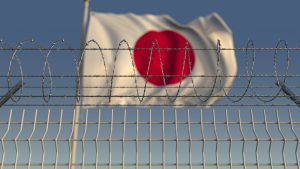Last week, Japan’s House of Representatives passed a bill to amend the Immigration Control and Refugee Recognition Act. The change speeds up the deportation of foreign nationals without a valid visa by allowing those seeking refugee status to be deported during the application process if it is their third application. Currently, no one can be deported from Japan with a refugee application pending.
The latest bill is the second attempt to amend the law following the death of a Sri Lankan woman, Wishma Sandamali, who died after complaining of poor health while being detained two years ago. The aim is to minimize time spent in detention.
However the main opposition party, the Constitutional Democratic Party (CDP), as well as the Democratic Party of Japan (DPJ) and the Japanese Communist Party, criticized the bill for containing minor revisions as opposed to undertaking a sweeping overhaul of detention protocol.
Supporters of the bill incorporated a clause on training staff and immigration officials in global issues to ensure refugee applications are carefully evaluated. A new system will also allow the temporary release of foreigners awaiting results of their applications for refugee visas. However, the decision to place a person in detention or supervised release in the community is made on a case-by-case basis. Once a person is detained, the possibility of a temporary release is only reviewed every three months.
Japan is a signatory to the United Nations Refugee Convention and is obligated to take in people fleeing persecution. The convention also prohibits the deportation of people claiming refugee status, and there is no limit to the number of times someone can apply for refugee status. But the proposed amendments to Japanese law would effectively limit refugee applications to two, as a person could be deported even while their third application is pending.
In 2021 Japan accepted only 0.7 percent of refugee applications compared to 25 percent in Germany and 32 percent in the United States. The fundamental problem behind Japan’s relatively low intake of refugees remains its rigid criteria for defining that status.
Immigration officials wield considerable power in determining an applicant’s refugee status. There are concerns as to whether the Immigration Bureau, as a policing agency, is able to examine applications fairly to protect people fleeing conflict. In March the Osaka district court recognized a Ugandan woman as a refugee after the Immigration Bureau denied her application.
In the lower house, deliberation between the ruling Liberal Democratic Party and opposition parties broke down over calls for launching an independent third party organization to evaluate refugee applications. The CDP rejected the amended bill for failing to reform the immigration system around improving human rights.
There has been a string of deaths in Japanese detention centers and public backlash over the treatment of detainees. The death of an Italian man in a Tokyo detention center from an apparent suicide last year and the death of a Nigerian man who went on hunger strike in protest against his long detention in 2019 have illustrated poor treatment by staff and the lack of appropriate medical care in detention facilities. The family of Sandamali the Sri Lankan woman who died in custody, said it is impossible to prevent a recurrence without a thorough investigation into what led to her death.
There are also longstanding problems concerning the children of refugee applicants. They live in limbo without residence status and are therefore excluded from national health insurance and the right to work. Critics have urged Japan to comply with the Convention on the Rights of the Child, which outlines a state’s responsibility to provide adequate living, education, and healthcare to children.
Last month the U.N. Human Rights Council Special Rapporteurs sent an open letter to the Japanese government highlighting how the proposed amendments fail to meet international human rights standards.
The current proposals aim to increase transparency in the refugee applicant process. But the tough refugee screening process as well as issues of lengthy periods of detention have yet to be resolved.

































